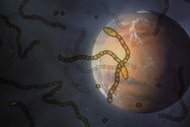Create a free profile to get unlimited access to exclusive videos, sweepstakes, and more!
Being grateful for, well, everything. Literally.

Today is Thanksgiving in America, a day we take a moment out of our lives to commemorate things we are thankful for (and also eat a lot of really great food).
I think there are a couple of ways to do this. The word "thankful" implies someone to thank; and of course we can be thankful to the people in our lives for what they mean to us. I'm all for that!
But there's also "grateful," which can be interpreted as being thankful when there's no person to thank. For example, I'm thankful my wife loves me and is there for me, but I'm grateful that circumstances led to us meeting all those years ago.
Thankful is an active thing, so you can thank those folks. Grateful is more passive, for things that happen.
Although I feel both, in this space today I want to acknowledge something I'm grateful for.
When I was a kid, just starting to learn the mechanics of astronomy — how the phases of the Moon worked, why some planets appear to move backward in the sky, how stars orbit around the galaxy — I ate it all up and was amazed by it all. I also subscribed to Astronomy magazine, which had a feature every month of things to see in the sky. I ate that up too.
After a year, though, I noticed something: The same things started appearing in the sky again. Once Orion disappeared in the Sun's glare in the late spring, it was out of my sight for a few months, until it popped up in the late evenings once again in the winter. This may be obvious to most people learning how the sky works, but with it came a revelation that shook me: There were only so many objects in the sky to see.
That really upset me. We'd eventually run out of things to observe! Once you've seen them all, then what?
I'm not kidding; this was something of an existential crisis for me. I still remember the mild panic and seething frustration of it, starting to take out my telescope and then thinking, "Why bother?" The finiteness of it felt like a wall dimly seen down a path I was taking.
What I didn't understand then is that re-observing the same objects makes them become old friends, like a comfy pair of warm socks waiting for you in the drawer every time the first chill comes back around. I can find the Ring Nebula in seconds in my telescope, and while it generally looks the same that doesn't matter. It's seeing it at all, knowing what it is, grasping its history, its eventual fate … those are what bring the awe and the wonder.
And perhaps this semi-random example I pulled out of my head is more appropriate than I first thought. For decades the Ring was thought to be a spherical shell of material around a dying star, edge-brightened like a soap bubble. But it's not: In recent years, using Hubble Space Telescope images, astronomers used a clever bit of logic to show that its not spherical at all, but more like a barrel, and we're looking at it almost exactly down one end. That revelation was a big deal to those of us who studied this kind of nebula.
And see how it fits in with my angst? The Ring is one of the most well-studied nebulae of its kind in the sky, and it wasn't until someone shook off their assumptions about it and really looked at it that its true nature was revealed.
Sure, there are a finite number of objects in the sky to see, but that doesn't mean there's a finite amount to know about them. There's always more.
… and even that caveat about there being a finite number of objects isn't really true. Not in practice. If you had told me in, say, 2016 that in just three years we'd observe not just one but two interstellar objects passing through our solar system, you'd have seen my eyes grow big in wonder.
But it's true. 1I/'Oumuamua passed the Earth and Sun back in 2017, a kinda-sorta comet from another star, and it turned out to be a lot weirder than we could've predicted. And now we have 2I/Borisov, another comet from another star, and as I've written before, the weird thing about it is how utterly mundane it is. It's acting just like any comet from our own solar system … a result that has profound implications for our own uniqueness in the Universe.
My teenage moment of scientific nihilism was, thankfully, brief. The more I learned about astronomy, the more I realized just how truly wondrous our Universe is, and how astonishing it is that we get to observe it, be a part of it, to try to understand it. We may never understand it all, literally never be able to grasp every single mechanism in it.
When I was a teenager that last bit may have spurred a moment of angst once again. But as an adult, someone with a few more orbital circuits under my belt, that gives me profound joy. There will always be more to learn. More mysteries to solve. More pieces to find. Forever and always.
And for that, I am very, very grateful.




























